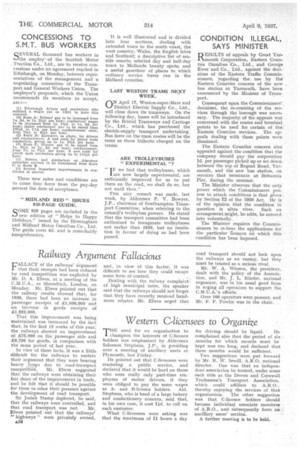Railway Argument
Page 52

If you've noticed an error in this article please click here to report it so we can fix it.
Fallacious
FALLACY of the railways' airgument that their receipts had been reduced by road competition was exploded by Mr. D. A. Elwes, at a meeting of the C.M.U.A., at Shoreditch, Landon, on Monday. Mr. Elwes pointed out that the railway results showed that, for 1936, there had been an increase in passenger receipts of £1,936,000 and an increase in goods receipts of
1,952,000.
That this improvement was being maintained was instanced by the fact that, in the first 12 weeks of this year; the railways showed an improvement of £75,000 on the passenger side and £9,750 for goods, in comparison with the same period of last year.
In view of these facts, it was a little difficult for the railways to sustain their argument that they were hearing heavy 1(mes due to road-transport competition. Mr. Elwes suggested that the railways were obtaining their fair share of the improvement in trade, and he felt that it should be possible for them to relax their pressure against the development of road transport.
Sir Josiah Stamp deplored, he said, that the railways were controlled, and that road transport was not. Mr. Elwes pointed out that the railways' " highways" were privately owned, £34 and, in view of this factor, it was difficult to see how they could escape some form of control.
Dealing with the railway complaint of high municipal rates, the speaker said that the railways should not forget that they have recently received handsome rebates. Mr. Elwes urged that road transport should not look upon the railways as an enemy, but they must be treated as a serious rival, Mr. W. A. Winson, the president, dealt with the policy of the Association, and Mr. J. L. Kinder, national organizer, was in his usual good form in urging all operators to support the C.M.U.A.'s efforts.
Over 100 operators were present, and Mr. F. F. Fowler was in the chair.




















































































